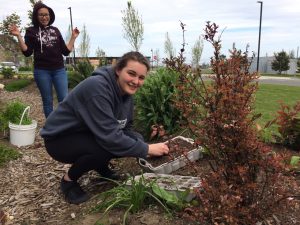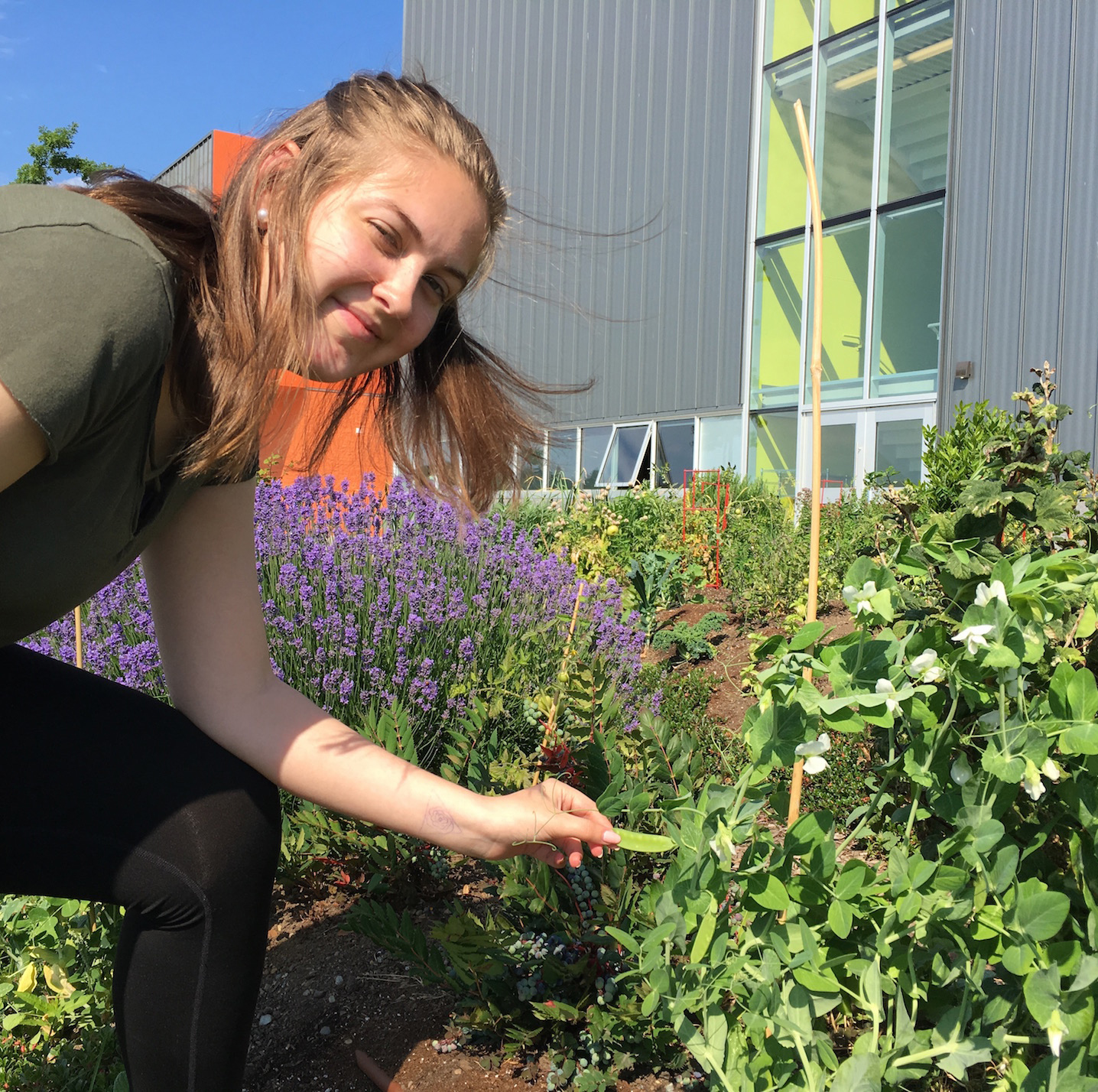Royal Bay Secondary School, Victoria, BC
2017-2018 (Year 2)
Royal Bay is a three-year old secondary school in the Sooke School District on Southern Vancouver Island, BC. This is the second year we have been working with the Farm to School Canada grant, which is managed collaboratively between our food studies programs and our culinary arts courses. Food studies students have used the grant to purchase materials to plant, grow, harvest and prepare food at our school, and our culinary arts students use produce from the garden and oversee the salad bar, which is available four days of the week.
This year we focused on expanding our growing to include indoor sprout and seedling production. We have a south facing, glass walled stairwell that gets very warm in the spring, so this became our greenhouse. We set up shelving to grow our vegetable starts and a successful spring basil crop. We also purchased an indoor growing table that produced sprouts and greens during the winter. Presently we have leeks and chard anxiously awaiting transplant into the garden. Some students will help with this task during a weekly focus block.
Many students participate in the program, from planting seeds and general tending to the garden to harvesting and preparing food with local ingredients. In trying to strengthen connections with local producers, our culinary students visit a local farm and assist with planting potatoes, and in exchange they receive some of the harvest in the fall.
One challenge we faced this year is not having the irrigation water (slow-drip hoses) turned on for the month of May while some maintenance was done to the irrigation system. As this was an important month for seedlings to get established, we had students water the plants by hand in order to keep them alive. Although this was a less efficient and convenient system, it did provide students with more opportunities to take care of the plants, and some students really enjoyed the regular watering routine.
Here is a statement from one of our active student gardeners:
“The garden is really important for this school. We grow lots of different vegetables and herbs in it and it shows the students how easy it is. The food is being used by the foods and cafeteria classes for cooking. The students learn which herbs should be used for what. But the garden is also really important in art and the garden has lots of different stuff to study. Some students from the photography class use the garden for their projects. Over the time I saw many students who took a look around the garden and showed interest in what is growing there.
I personally enjoyed helping plant seeds and see them grow. It taught me alot and I am really thankful for that. The work in the garden was always a nice break from the normal school day. Seeing people making food out of the stuff we grew there was nice to see”.
Next year our senior food studies students will be benefiting from a SET BC grant that will provide technology for creating short films on food producers in our region. We are looking forward to documenting some of the farmers and Indigenous knowledge keepers as they share stories of why and how they produce and gather foods from our region. We also hope to be involved in a district-wide strategic planning process around strengthening connections between students and gardening in our district. We are very grateful for the opportunities that this grant has provided for us to bring our food studies and culinary arts curriculums to life – literally!
2016-2017 (Year 1)

We have a grand vision for Farm to School at Royal Bay Secondary – we want nothing less than full engagement of our school community in the creation of sustainable food systems. But where to begin? This is our story, year 1.
Royal Bay Secondary School is located in on the border of Colwood and Metchosin, in Southern Vancouver Island. It is only 2 years old, but growing very rapidly, as our local population is booming. We are also located near a number of agricultural hotbeds, including Metchosin, the Saanich Peninsula and the Cowichan Valley.
Our school offers a Culinary Arts program and Food Studies program. Between these two types of classes, we are working to engage students in local food systems in a number of ways. This year nearly all the chicken, pork and beef that was served in our cafeteria were raised by farmers from the region. Students learned where the meat came from and were involved in the breaking down and preparation of these animals for our school meal service. Students also participated in a number of farm visits, including a local certified organic vegetable farm, a local sheep farm, and assisted with planting potatoes from a local CSA initiative that we will harvest in the fall.
In addition to building relationships with local farmers, we have been working to engage students in some basic food production activities on site. We have a small herb/native plant/veggie garden that gives students an opportunity to plant seeds, transplant seedlings, observe plants’ dependence on nature’s cycles, watch the pollinators come in and learn about traditional uses of plants. Students have also harvested radishes, kale, herbs and greens this spring.
Recently we started an On Wednesdays We Eat Greens campaign at our school to promote the salad bar program and to provide students with an opportunity to “serve themselves” (That students could self select foods from our salad bar was a criteria of our new Farm to School grant). Every Wednesday our salad bar detaches from the cafeteria and is opened up to self-service in our commons. In addition to raising the profile our salad bar, students were challenged to create value-added products from the garden or a local product for the Wednesday salad bar service. Some items included rhubarb pop tarts, kale chips, beef jerky, smoked salmon and homemade chips and salsa. This was a fun and creative project that we hope to continue next year – the kale chips were a hit!
This year we have also been working with a local non-profit called Lifecycles to plan future garden expansion at our school. Eventually we would like to see a more robust outdoor classroom that includes more diverse food and learning opportunities. Although we’ve been anxious to dive into this development, our school is facing an imminent expansion which puts hold on any garden development at this time. However, through the designs we have developed we’ve been able to have meaningful conversations with architects, our district management and grounds staff towards having an outdoor classroom be considered as part of the addition. We will continue to advocate for this to include the installation of permanent irrigation, fencing, a shelter, as well as fruit trees, vegetable beds, a greenhouse and toolshed.
Stay tuned for Royal Bay Secondary’s Farm to School Story, Year 2. We hope to have a commitment to our garden design in place!




